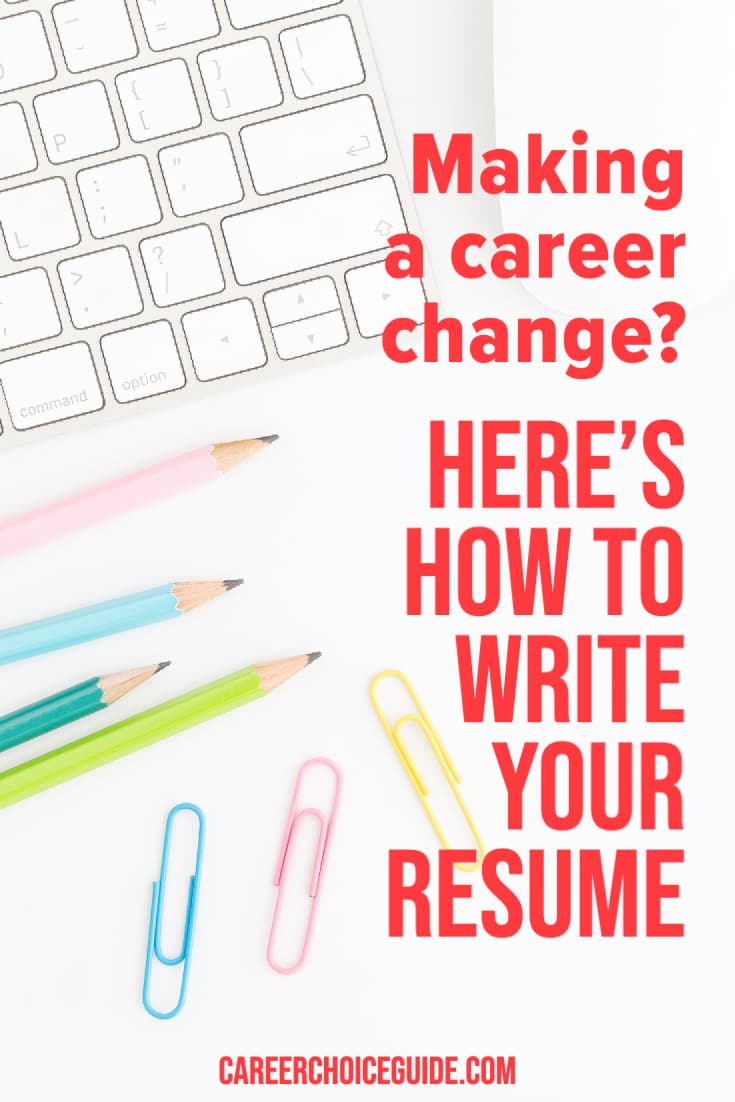Career Change Resume Sample and Tips
Career change resume sample and six strategies job seekers can use to highlight your most marketable skills when you're making a career change.
If you're launching a new career, there are a few key issues you need to address when writing your resume. You'll need to transform your past experience so you can present yourself as an ideal candidate for a job in your new field of work.
Fortunately, there are plenty of effective strategies you can use to achieve that goal.
In addition to the career change resume sample below, you'll also find on this page six essential strategies career changers can use to write compelling resumes. There's also an analysis of the career change resume sample that highlights and explains the choices made to transform the resume into an effective self-marketing tool for a career changer.
Here's what we'll cover:
- Key resume writing concerns for career changers — Discover what you need to know to write an effective resume when making a career change.
- How to write a career change resume — Six specific strategies career changers can use to highlight your greatest assets on your resume.
- Career change resume sample — A sample resume that shows these strategies in practice.
- Key choices made on the sample resume — A review of the example resume describing why specific choices were made.
Key Resume Writing Concerns for Career Changers
The biggest challenge career changers face when writing a resume is you need to find a way to present yourself as a person who is a great fit for your new career.
Making that type of impression, however, can be challenging because your strongest experience is probably with your current career, and not the new career you want to launch.
To write an effective career change resume, you need to find strategies to:
- Put your most relevant experience at the top of your resume, particularly if your work history isn't your greatest asset.
- Write about all of your skills, experience, and accomplishments in ways that reflect your new career.
- Show how skills you developed through your past jobs translate to your new career.
How to Write a Career Change Resume
To write an effective career change resume:
- Choose a combination resume format.
- Put your most relevant experience first.
- Include detailed information about your most relevant experience.
- Include less information about less relevant experience.
- Use language and points that are relevant to your new career when you describe your experience.
- Avoid using jargon from your past job or industry.
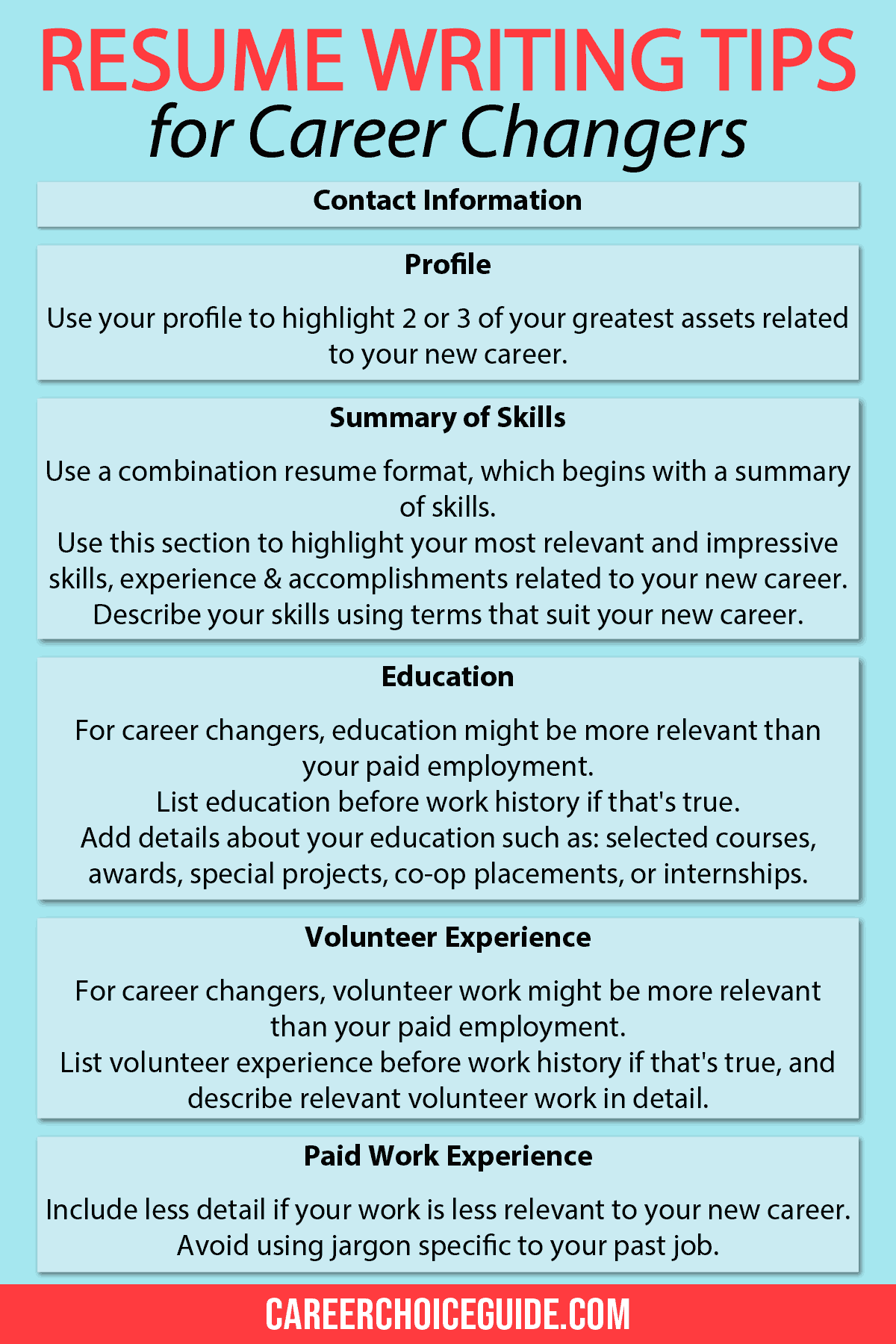
1. Choose a combination resume format.
Standard resume organization puts employment experience near the beginning of the resume. If you're a career changer, you'll almost always need to change this organization because you won't have paid work experience in your new career.
Your work history won't be your most marketable experience, so it's not what you want employers to see first when they review your resume.
A combination resume format will give you all of the flexibility you'll need to organize the entries on your resume to your best advantage. You'll be able to position the skills and experience that are most relevant to your new career at the beginning of your resume, so you can quickly grab employers' attention.
Career changers should avoid using a chronological resume because that format makes your work history — not your biggest selling feature — most prominent.
You should also avoid using a functional resume format because it omits essential information that employers expect to see. Employers know job seekers use functional resumes to hide certain issues in their work history, so most employers do not trust functional resumes.
2. Put your most relevant experience first.
When you write a resume, you'd typically organize your experience in the following order:
- work history
- education
- volunteer work (optional)
The experience sections are organized in order of importance. Usually work experience will be a job seeker's greatest asset, followed by education, and possibly volunteer work.
If you're making a career change, you won't have employment experience in your new industry. Your work history probably won't be your more marketable experience, so it's not the first thing you'll want to show employers.
You may have returned to school to earn a degree, diploma, or certificate to help you launch your new career. In that case, your education is the first experience employers should see. It will be more relevant than your work history, so you should list education before work experience.
Similarly, you may have done some volunteer work or completed internships to gain experience in your new career. For career changers, this unpaid work experience will be more relevant than your past paid employment.
Employers need to see that valuable unpaid experience, so it should be listed before your work history.
The experience sections on a typical career change resume would be organized like this:
- education (if you went back to school to gain education related to your new field of work)
- internships (if you completed internships relevant to your new career)
- volunteer work (if you have volunteer experience relevant to your new career)
- work history (assuming you don't have paid work experience that is relevant to your new career)
3. Include detailed information about your most relevant experience.
Typically, resumes don't include a lot of details about education or volunteer work. But three types of job seekers can often benefit from including detailed information about education or volunteer work:
- students
- new graduates
- career changers
If you are a job seeker with an established career, work history will be your most relevant experience, so work history is described in detail while other resume sections contain less detail.
For many students, new graduates, and career changers, however, education and volunteer work encompass the important experiences that should be described in detail on a resume.
If your education plays an important role in your career change, be sure to describe it thoroughly. You may include select courses you completed, awards you received, special projects you worked on, and co-op placements or internships you completed.
If your volunteer work played an important role in preparing for your career change, be sure to describe that experience in detail. Give as much care and attention to describing your volunteer experience as you would normally give to describing your paid employment.
4. Include less information about less relevant experience.
Standard resumes for job seekers with established careers include significant details about work experience. But if you're making a career change, your past work history won't be as relevant to employers in your new industry.
Career changers often benefit from including less detailed information about past jobs. Include points about your past work to describe skills and experiences that are relevant to your new job. Don't spend a lot of time describing tasks or skills that are totally irrelevant to your new career.
5. Use language and points that are relevant to your new career when you describe your experience.
Many industries and jobs commonly use specific language. You may find your new career involves work similar to your past career, but the words used to describe that work are different.
For example:
Adult education teachers and workshop facilitators both lead groups to share information, but adult education teachers call the people they work with "students" and workshop facilitators call the people they work with "clients."
Your career change resume should include language and terms that are commonly used in your new career.
Write about your past work experience in a way that shows how your skills transfer to your new job. If similar tasks are expressed using different terms in your past career, switch to language you'd use in your new career as long as it is reasonable and honest to do so.
6. Avoid using jargon from your past job or industry.
As you write your career change resume, stay away from using any industry-specific terms from your past job. If a word or phrase wouldn't be easily understood by an outsider, it should be described in more general terms.
Career Change Resume Sample
Now that you know some key strategies for writing a career change resume, take a look at these techniques in action on the following career change resume sample.
In this resume example, we have a teacher who has several years of experience teaching music and adult education. She wants to work as a career advisor, and she has recently completed a diploma to help reach that goal.
This career change resume sample shows how she can organize her resume to put her greatest assets — in this case, her education and internships — ahead of her related, but less relevant work history. You'll also see how she can carefully choose the language she uses to describe her teaching jobs so they relate better to her new career.
Career Change Resume Sample — Page 1
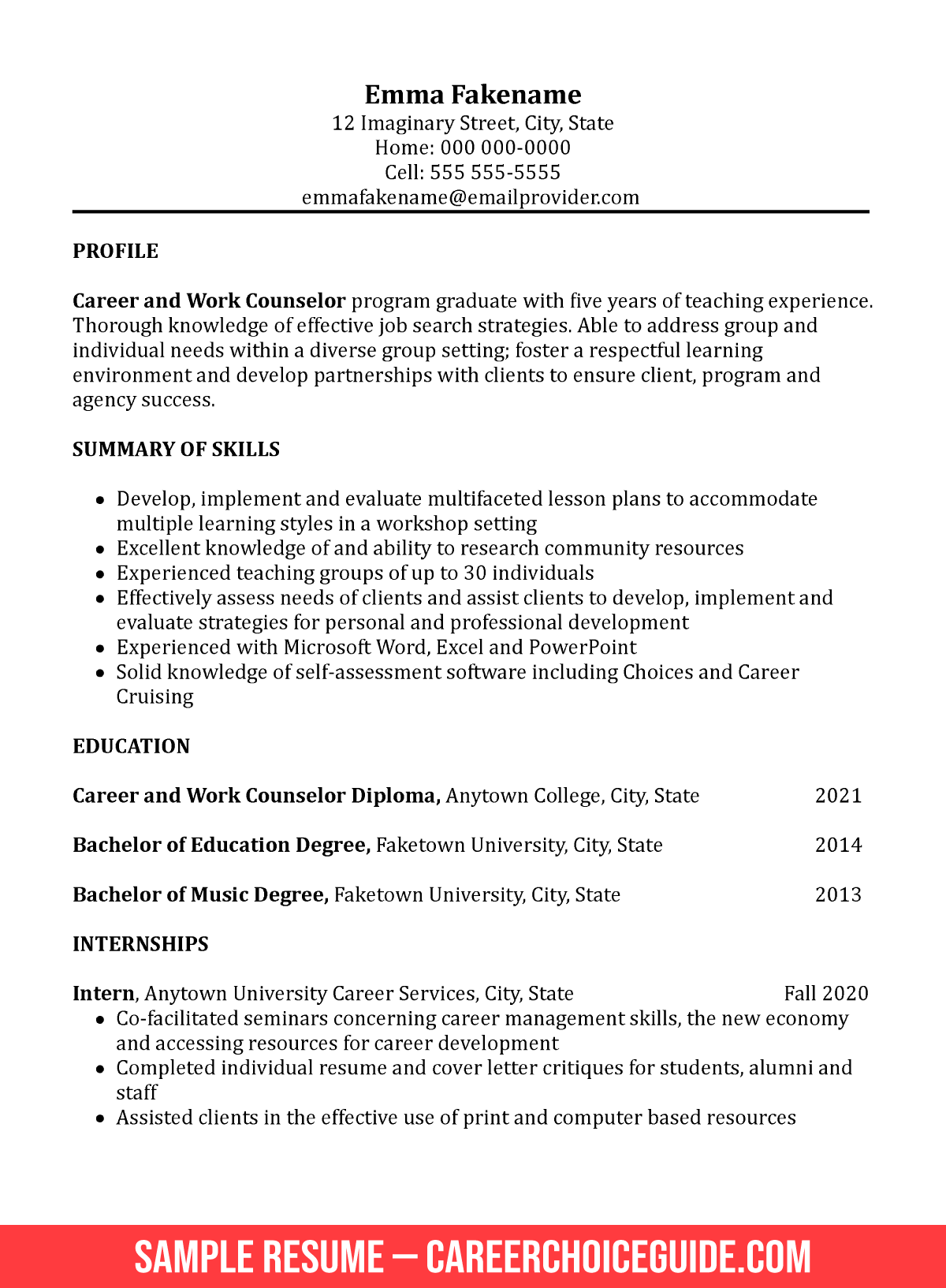
Career Change Resume Sample — Page 2
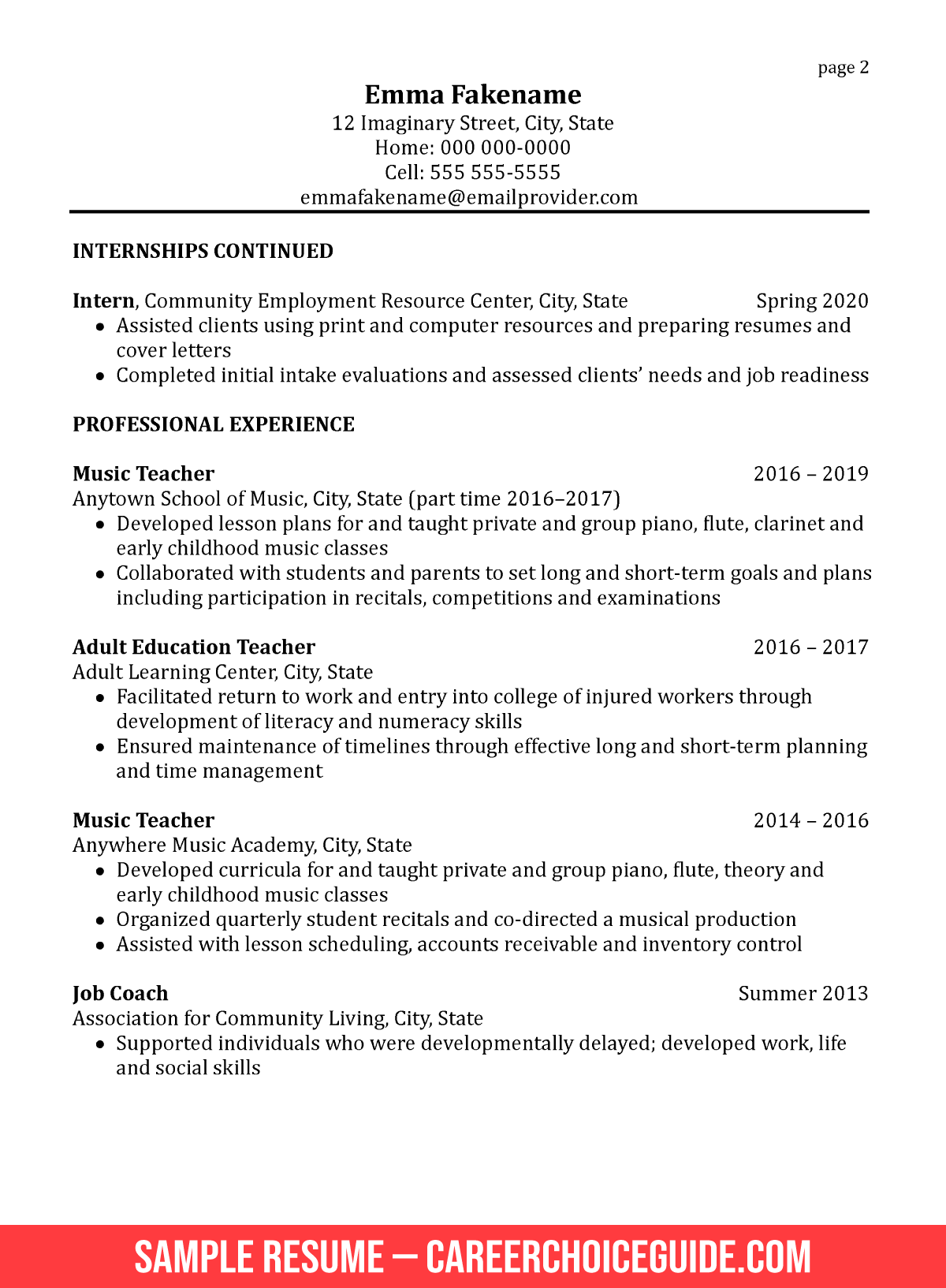
Key Choices Made on the Career Change Resume Sample
Let's review some key decisions made while writing this career change resume to show the reasons behind those choices.
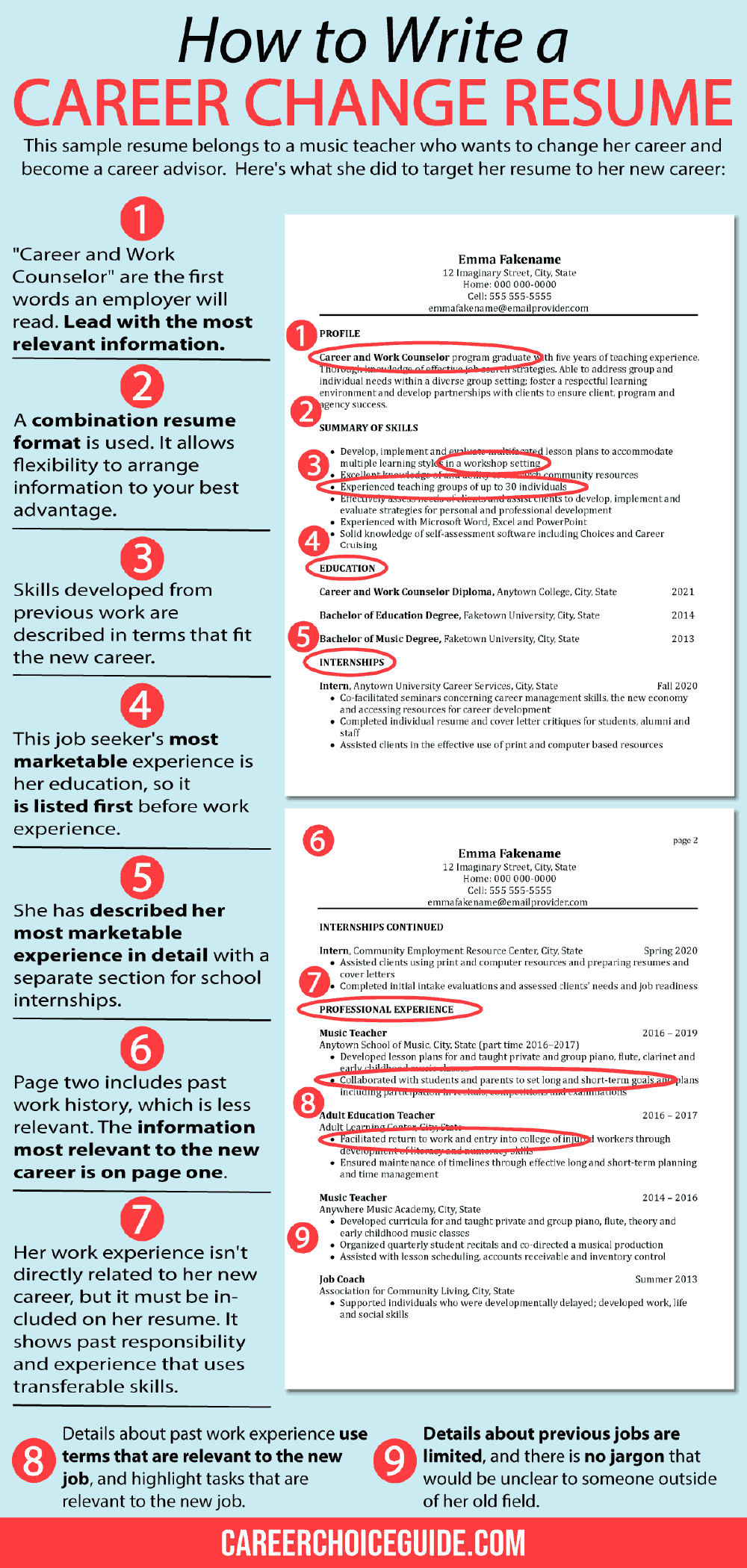
The numbered sections below correspond with the numbered examples on the graphic above.
1. Lead with the most relevant information.
The profile is used effectively to present this job seeker as a career advisor, and not a music teacher.
The words "Career and Work Counselor" are written in this section at the top of the resume. They are the first words an employer will read. Bolding those words help them to stand out and quickly direct the employer's attention.
Although this job seeker has never held this type of job, she's able to use her recent school work to lead with that very relevant information.
Her profile is honest, stating she is a recent graduate of a career counseling program. She doesn't try to overstate her experience, but her profile still makes the employer think "career counselor" and not "music teacher" at first glance.
2. Use a combination resume format.
A combination resume format includes a summary of skills followed by experience and education. This resume format is a lot more flexible than a chronological resume. It gives career changers the freedom to list relevant skills and experience first even when those skills weren't developed through paid employment.
The skills summary at the top of the resume is particularly helpful for career changers. It can be used to highlight almost any information you want to feature on your resume.
3. Use the language used in your new career.
The job seeker featured in this career change resume sample has experience teaching music to children. Her new career may involve a similar task — facilitating workshops for adult clients.
On her resume, she describes her teaching skills in terms that help employers imagine her leading workshops for adults, not teaching music to children.
4. List your most relevant experience first.
This job seeker's most marketable experience is her education and her internships, so those items are listed first, before paid work experience.
5. Describe your most relevant experience in detail.
This job seeker has described her most marketable experience, education, in detail on her resume.
She completed two internships as a part of her college program. Those internships provided valuable practical experience in her new field, so she has listed them under a separate section and provided thorough information about the work she did with each organization.
6. List your most relevant information on page one.
This advice applies to all types of job hunters — not just career changers. Notice that, by the time we get to page two of this career change resume sample, the most relevant information has already been presented. The second page contains essential but less relevant information.
7. Include past work experience.
Omitting your work experience because you're making a career change is a mistake.
When you include your past work history — even if it isn't particularly relevant to your new career — you can demonstrate past responsibility and describe experience that uses transferable skills.
Omitting your work history can raise red flags in the minds of employers. They expect to see this information on your resume. If it's not there, they may wonder what you're trying to hide.
8. Use language relevant to your new career.
Details about past work experience should be described in terms that are relevant to the new job. Any points you include should highlight tasks that are relevant to the new job.
In this example, the job seeker describes her teaching skills, which are transferable to her new career. She doesn't go into detail about the subjects she taught because that information is not relevant to her new career.
9. Avoid jargon from your past work.
Details about previous jobs are limited in this sample resume. It contains no jargon that would be unclear to someone outside of her old field of work.
Moving Forward
If you're looking for a comprehensive, step by step guide for writing a resume, including what to do if you're making a career change, my book, The Resume Writing Guide can help. It will show you exactly how to highlight your experience to make the best possible impression on employers in whichever field of work you want to pursue.
